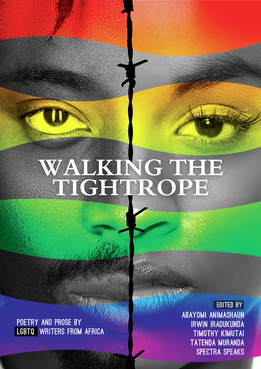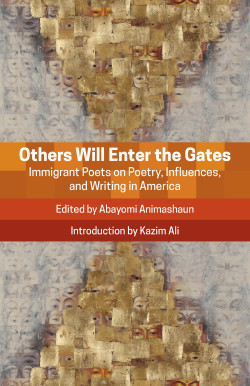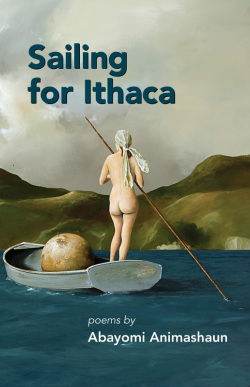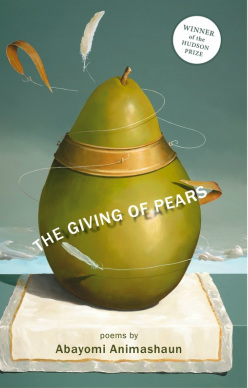
Praise for Walking the Tightrope
“Often LGBT people are regarded as less than human – opposing the nature of things and godly creations. Walking the Tightrope reminds us that it takes work to be human. Those of us who do not have the pleasure of taking life for granted are constantly reminded of the struggle to be human. It is not merely a matter of being given an intrinsic right because even that can sometimes leave you insufficient. The work of being human is to deal with the exact issues explored in this book: connectedness; fragility; fluidity; malleability; plasticity; failure; achievement and resistance.”
— Zethu Matebeni (from the Introduction)
Institute of Humanities in Africa,
University of Cape Town
“The publication of Walking the Tightrope could not be more timely or relevant. It questions the wave of homophobic fervor currently sweeping across contemporary Africa, and the single code of heterosexuality hoisted on the flag of nationalism to score points on religious and moral superiority. Unequivocally, the voices assert, they are not a symbol of moral decadence, or a ‘choice’; rather, their sexuality, their gender is natural to their creation. These voices are pressing, vital, and cause for deep reflection.”
— Omofolabo Ajayi Soyinka
Professor Emerita of Women’s Studies
and Gender & Sexuality Studies
University of Kansas
“Often LGBT people are regarded as less than human – opposing the nature of things and godly creations. Walking the Tightrope reminds us that it takes work to be human. Those of us who do not have the pleasure of taking life for granted are constantly reminded of the struggle to be human. It is not merely a matter of being given an intrinsic right because even that can sometimes leave you insufficient. The work of being human is to deal with the exact issues explored in this book: connectedness; fragility; fluidity; malleability; plasticity; failure; achievement and resistance.”
— Zethu Matebeni (from the Introduction)
Institute of Humanities in Africa,
University of Cape Town
“The publication of Walking the Tightrope could not be more timely or relevant. It questions the wave of homophobic fervor currently sweeping across contemporary Africa, and the single code of heterosexuality hoisted on the flag of nationalism to score points on religious and moral superiority. Unequivocally, the voices assert, they are not a symbol of moral decadence, or a ‘choice’; rather, their sexuality, their gender is natural to their creation. These voices are pressing, vital, and cause for deep reflection.”
— Omofolabo Ajayi Soyinka
Professor Emerita of Women’s Studies
and Gender & Sexuality Studies
University of Kansas

Praise for Others Will Enter the Gates
"Others Will Enter the Gates is a multilayered exploration by writers of different generations and backgrounds that passionately offers an urgent and daring insight into America’s ever-expanding literature on the immigrant experience..."
— Dike Okoro
"For its capacious sweep from self-definition to self-invention, from the mother to the many tongued, this collection is indispensable not only for any poet, but for anyone interested in becoming one..."
— Pimone Triplett
"Others Will Enter the Gates is a timely and necessary collection and to say that it is thought-provoking and versatile is an understatement..."
— Virgil Suarez
"Each time I open this book, each time I follow one of these fine poets through another gate in this country of a thousand gates, I feel like an immigrant again, realigned with my own Huguenot ancestors fleeing the religious tyrannies of France three centuries ago. To read these essays is to have your faith in the poetic future of this land restored, over and over again."
— David Shumate
"The great irony and most fabulous beauty of this very real and readable collection of essays are testament to why poetry has lasted for tens of thousands of years..."
— Ralph Angel
"...This is a striking and essential collection, one in which the reader vicariously becomes an immigrant of sorts, allowed to pass over personal and national borders, ferried along by the beautiful and vital prose of some of the finest poets working in the U.S. today."
— Todd Davis
"Others Will Enter the Gates is a multilayered exploration by writers of different generations and backgrounds that passionately offers an urgent and daring insight into America’s ever-expanding literature on the immigrant experience..."
— Dike Okoro
"For its capacious sweep from self-definition to self-invention, from the mother to the many tongued, this collection is indispensable not only for any poet, but for anyone interested in becoming one..."
— Pimone Triplett
"Others Will Enter the Gates is a timely and necessary collection and to say that it is thought-provoking and versatile is an understatement..."
— Virgil Suarez
"Each time I open this book, each time I follow one of these fine poets through another gate in this country of a thousand gates, I feel like an immigrant again, realigned with my own Huguenot ancestors fleeing the religious tyrannies of France three centuries ago. To read these essays is to have your faith in the poetic future of this land restored, over and over again."
— David Shumate
"The great irony and most fabulous beauty of this very real and readable collection of essays are testament to why poetry has lasted for tens of thousands of years..."
— Ralph Angel
"...This is a striking and essential collection, one in which the reader vicariously becomes an immigrant of sorts, allowed to pass over personal and national borders, ferried along by the beautiful and vital prose of some of the finest poets working in the U.S. today."
— Todd Davis

Praise for Sailing for Ithaca
"In this book, back then, now, and tomorrow collapse into a vivid voice, song by song. Far geography becomes one deft swirl that gathers Odysseus, Achebe from Nigeria, Cavafy from Alexandria, a host of village kin, and this immigrant’s lyric wanderings in America into one resonant utterance. Reading, you see the fresh energy of a keen observer informing a new English with the authority of a wise African voice. Like the wild winds and currents of the sea, these forces gather to hasten Animashaun’s bold poems into your dreams." — Kim Stafford
"Sailing for Ithaca is a remarkable manifold and pluralistic poetic journey that seeks 'the country within.' From children playing with rats in a Nigerian 'Beggar's Colony' to tourists drunk and asleep on the Island of Polyphemous, this collection vividly evokes a multiplicity of worlds. Yet, this book of deracination knows that one can come home only in wisdom. No conquering Odysseus here, but rather a generosity of inclusion and relinquishment. The traveler becomes the landscape he travels through, 'The open field/The thick brush/The village/Where nothing lives" and 'The wilderness/Where all is born.' The book itself becomes a journey, inviting us to 'Enter where you can/Leave in delight.'" — Rebecca Seiferle
"These poems are parables of interiority, legends and tales of the unique feeling-scapes within each of us. Sometimes we seem to be journeying to the poet’s childhood in his native Nigeria, while at other times we might be sailing with him to the islands of the Homeric epics. In poem after poem, however, where we are really going is closer and closer to this poet’s sense of the human heart, that “place” where, he writes, we might take sorrow out of the cellar, dress it up in a child’s fresh school-uniform, send it off to meet the others it will study with, help it shake hands and strike up friendships, and laugh at jokes told in the morning light. In poems that are as lucid, sharp, and strange as a waking dream, Animashaun gently guides us toward “the Ithaca within” each of us." — Fred Marchant
"In this book, back then, now, and tomorrow collapse into a vivid voice, song by song. Far geography becomes one deft swirl that gathers Odysseus, Achebe from Nigeria, Cavafy from Alexandria, a host of village kin, and this immigrant’s lyric wanderings in America into one resonant utterance. Reading, you see the fresh energy of a keen observer informing a new English with the authority of a wise African voice. Like the wild winds and currents of the sea, these forces gather to hasten Animashaun’s bold poems into your dreams." — Kim Stafford
"Sailing for Ithaca is a remarkable manifold and pluralistic poetic journey that seeks 'the country within.' From children playing with rats in a Nigerian 'Beggar's Colony' to tourists drunk and asleep on the Island of Polyphemous, this collection vividly evokes a multiplicity of worlds. Yet, this book of deracination knows that one can come home only in wisdom. No conquering Odysseus here, but rather a generosity of inclusion and relinquishment. The traveler becomes the landscape he travels through, 'The open field/The thick brush/The village/Where nothing lives" and 'The wilderness/Where all is born.' The book itself becomes a journey, inviting us to 'Enter where you can/Leave in delight.'" — Rebecca Seiferle
"These poems are parables of interiority, legends and tales of the unique feeling-scapes within each of us. Sometimes we seem to be journeying to the poet’s childhood in his native Nigeria, while at other times we might be sailing with him to the islands of the Homeric epics. In poem after poem, however, where we are really going is closer and closer to this poet’s sense of the human heart, that “place” where, he writes, we might take sorrow out of the cellar, dress it up in a child’s fresh school-uniform, send it off to meet the others it will study with, help it shake hands and strike up friendships, and laugh at jokes told in the morning light. In poems that are as lucid, sharp, and strange as a waking dream, Animashaun gently guides us toward “the Ithaca within” each of us." — Fred Marchant

Praise for The Giving of Pears
"Abayomi Animashaun’s poems hum inside like a good cocktail. When he invokes, ‘Lead us into that pure elegance,’ he is cherishing cities, foods, colors, human histories of passion and hope, with a lush affection and rich attention. These poems are blessings to the spirit. Their vivid, magical powers of witness lift up the world.” —Naomi Shihab Nye
“In Abayomi's world, gods and prophets and dead friends walk ‘in and out of walls.’ Fruits and animals of a lost ancestral village – guava, iguanas and goats, flock on flock – assert their spiritual presence. To say these are merely “religious” poems would be an understatement…these poems vibrate with living spirits, giving voice and honor to the unseen. Indeed, this is a fresh and dazzling first book.” —Marilyn Chin
“Abayomi Animashaun’s The Giving of Pears is a tribute to inner lives: of people, of fruit, of vegetables, of trees. Animashaun’s poems read as parables, using magic and myth, to sustain emotional power as he explores violence, tranquility, and the dead. The effervescent surface of these poems and their rich underpinnings make The Giving of Pears an exciting debut.” —Denise Duhamel
“These poems are subtle, wide-ranging, and lovely, recreating a world steeped not only in myth, loss, and the vagaries of memory, but in the daily life of Abayo Animashaun’s native Nigeria. Here, a speaker recounts conversations with Mohammed or Noah. Elsewhere, angels hang up their wings and head to the barbershop for a haircut and a shave. One poem teaches us how to speak to birds, another meditates wittily on folklore, while, in a third, the speaker’s dead friends walk “in and out of walls.” And within a kettle, a whole village boils and thrives. By turns erotic, elegiac, and meditative, these rich poems suggest an ambitious, fiercely original young poet, one whose work I’m sure I’ll return to again and again.” —Kevin Prufer
"Abayomi Animashaun’s poems hum inside like a good cocktail. When he invokes, ‘Lead us into that pure elegance,’ he is cherishing cities, foods, colors, human histories of passion and hope, with a lush affection and rich attention. These poems are blessings to the spirit. Their vivid, magical powers of witness lift up the world.” —Naomi Shihab Nye
“In Abayomi's world, gods and prophets and dead friends walk ‘in and out of walls.’ Fruits and animals of a lost ancestral village – guava, iguanas and goats, flock on flock – assert their spiritual presence. To say these are merely “religious” poems would be an understatement…these poems vibrate with living spirits, giving voice and honor to the unseen. Indeed, this is a fresh and dazzling first book.” —Marilyn Chin
“Abayomi Animashaun’s The Giving of Pears is a tribute to inner lives: of people, of fruit, of vegetables, of trees. Animashaun’s poems read as parables, using magic and myth, to sustain emotional power as he explores violence, tranquility, and the dead. The effervescent surface of these poems and their rich underpinnings make The Giving of Pears an exciting debut.” —Denise Duhamel
“These poems are subtle, wide-ranging, and lovely, recreating a world steeped not only in myth, loss, and the vagaries of memory, but in the daily life of Abayo Animashaun’s native Nigeria. Here, a speaker recounts conversations with Mohammed or Noah. Elsewhere, angels hang up their wings and head to the barbershop for a haircut and a shave. One poem teaches us how to speak to birds, another meditates wittily on folklore, while, in a third, the speaker’s dead friends walk “in and out of walls.” And within a kettle, a whole village boils and thrives. By turns erotic, elegiac, and meditative, these rich poems suggest an ambitious, fiercely original young poet, one whose work I’m sure I’ll return to again and again.” —Kevin Prufer
